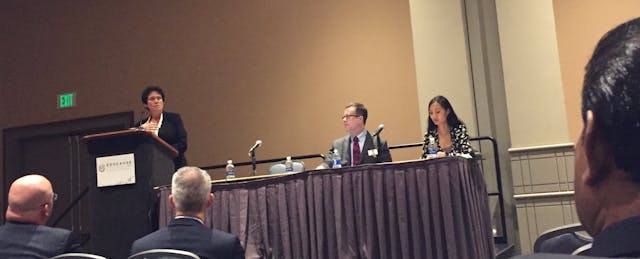The Federal Communications Commission is reconsidering how it regulates the flow of information online, and academic groups are making their case to protect so-called “net neutrality” rules.
In a session at the annual EDUCAUSE conference on Wednesday, three panelists encouraged the audience to advocate for net neutrality, stressing its importance to higher education institutions, libraries and other public service organizations.
Net neutrality is the idea that internet service providers shouldn’t be allowed to favor some data or content on the internet over others. Companies that oppose net neutrality generally argue that they favor openness but feel that government regulation is unnecessary and can stifle competition.
Under the Obama administration in 2015, the internet went from being categorized as an information service to a utility, said Tracy Mitrano, an attorney who used to be the director of information technology policy at Cornell University. But now, the Trump administration wants to shift that category back to information service, which is seen as a shift away from net neutrality.
Speaking at the Newseum in Washington, D.C. in April 2017, FCC Chairman Ajit Pai criticized the 2015 reclassification from Title I to Title II, saying the FCC imposed “a set of heavy-handed regulations upon the internet” on a party-line vote. He added that after the classification changed in 2015, "infrastructure investment declined.” Mitrano, who is running for congress, said in an interview that she wants the internet to remain categorized as a utility—which she says gives a stronger legal defense for net neutrality. Mitrano believes that congress is the right level of government to resolve the issue. “But that means you’re going to have to have a congress that gets it and a congress that is willing to vote for it,” she said.
Mitrano pointed out that the voice of higher education and libraries “dominated when the internet was first made public.” She advocated that the audience members go back and “get in with the government people” at their institutions, and tell “the large associations” like the American Council on Education that they “want for the betterment of higher education not to have there be a change” from the current classification of the internet.
Jarret Cummings, EDUCAUSE’s director of policy and government relations, argued that net neutrality is an important issue in higher education, since open access to ideas and information is such a key principle of colleges and academic libraries.
“It simply comes down to who gets to determine when, where and how our stakeholders get to access our online resources and services via their home and mobile connections,” Cummings said.
When students and professors are on campus, they “have tremendous access to broadband,” but when they're away and trying to access online courses and other materials, they’re dependent on home and mobile connections.
“Without network-neutrality protections, that access can be constrained, it can be redirected—there are a variety of ways in which it can be monetized for the benefit of organizations other than the colleges and universities and the public-service missions that we sustain,” Cummings said.
Without network-neutrality protections, he said, there’s “nothing to prevent a major telecommunications company from buying an online learning provider” and having a “competitive advantage” by controlling access to other providers and data traffic.
Cummings said net neutrality will ultimately “be back in the courts” and in congress. But in the meantime, “we want to do everything we can to preserve as much network neutrality we can while looking ahead.”
Krista Cox, director of public policy initiatives at the Association of Research Libraries, said that all libraries have the same core mission: to “preserve and provide access to information and to knowledge.” Library activities depend on the open internet, and giving members of congress concrete examples is meaningful and persuasive.
“It's so important to make sure that members of congress hear your voice and hear the voice of your institutions and understand why network neutrality is so important; I think it's always helpful to have stories from your institutions of the projects and programs that you have on your campuses that depend on the open internet that your federal relations officers can share with your member of congress, because members of congress are so proud of the innovations and the institutions that they have in their districts or in their state.”


